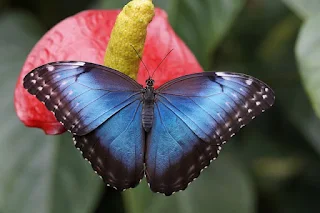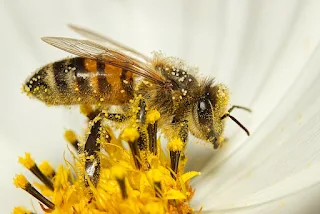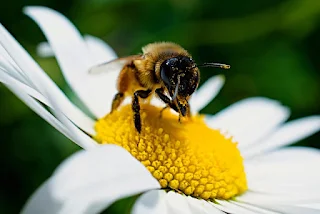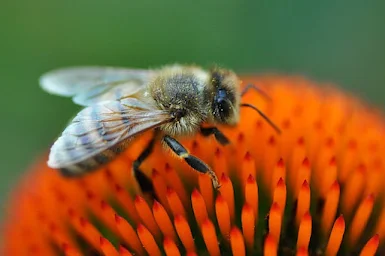The use of pesticides in lawn care has become a widespread practice across the globe. However, it is important to understand the negative impact that pesticides have on pollinators, especially bees. Bees play a vital role in the ecosystem, pollinating plants and crops, and ensuring the survival of our food production.
One of the primary concerns with the use of pesticides in lawn care is the effect it has on bees and the ensuing Colony Collapse Disorder.
Colony Collapse Disorder
Colony collapse disorder (CCD) is a phenomenon where entire colonies of honeybees die off or disappear from their hives. CCD is characterized by the rapid loss of adult bees, leaving behind a queen and a few nurse bees who are unable to maintain the colony.
The cause of CCD is not yet fully understood, but there is evidence to suggest that exposure to pesticides, specifically neonicotinoids, is a significant factor. Neonicotinoids are a class of pesticides that are widely used in agriculture and lawn care. They are highly toxic to bees and can cause disorientation, paralysis, and death. Neonicotinoids can also weaken the immune system of bees, making them more susceptible to diseases and parasites, which can lead to colony collapse.
In addition to exposure to pesticides, other factors that may contribute to CCD include habitat loss, disease, and climate change. Bees rely on a diverse range of plants for food and habitat, but the loss of natural habitats due to urbanization, deforestation, and monoculture agriculture can reduce the availability of these resources. Diseases and parasites, such as the Varroa mite, can also weaken bee colonies and make them more vulnerable to CCD. Climate change can affect the timing and availability of flowers and disrupt the natural cycles that bees rely on for food and reproduction.
The implications of CCD are significant, both for the environment and human populations. Honeybees are responsible for pollinating a significant portion of the world's food crops, including fruits, vegetables, nuts, and seeds. Without honeybees and other pollinators, our food production would be severely impacted, leading to food shortages and higher food prices. In addition, the loss of pollinators can have a ripple effect on the ecosystem, as other species rely on them for food and habitat. The loss of biodiversity and ecosystem services provided by pollinators can also have negative impacts on human health, such as the loss of medicinal plants.
To address CCD and protect honeybees and other pollinators, it is essential to adopt environmentally friendly practices in agriculture and lawn care, reduce the use of pesticides, plant diverse native habitats to support pollinators, and support policies and initiatives that promote their protection. It is also important to raise awareness about the importance of pollinators and the threats they face, and to take action to protect them for the health and well-being of our planet and future generations.
Pollinators rely on a diverse range of plants for food and habitat, but the loss of natural habitats due to urbanization, deforestation, and monoculture agriculture can reduce the availability of these resources. This can lead to malnutrition and weakened immune systems, making the bees more vulnerable to diseases and parasites, which can ultimately lead to colony collapse.
Disease and parasites are also significant contributors to CCD. The Varroa mite, a parasitic mite that feeds on the bodily fluids of bees, weakens the bees' immune system and spreads viruses, making the bees more susceptible to other diseases and parasites. The spread of diseases and parasites can be exacerbated by poor hive management practices, such as overcrowding and poor hygiene.
Climate change is another factor that can affect bee populations and contribute to CCD. Changes in temperature and precipitation patterns can affect the timing and availability of flowers, disrupting the natural cycles that bees rely on for food and reproduction. This can lead to malnutrition and weakened immune systems, making the bees more vulnerable to diseases and parasites.
Other Pollinators
 |
| It's not just bees that pollinate! |
The reduction of pollinator populations can have far-reaching consequences for the environment, including the loss of biodiversity and ecosystem services. The ecosystem services provided by pollinators include pollination, pest control, and soil fertility. Without pollinators, the functioning of the ecosystem could be severely impacted, leading to a decline in the health of plants and animals.
We're Killing Pollinators
The impact of pesticides on pollinators can have cascading effects on entire ecosystems. Pollinators are essential for the reproduction of many plant species, and their decline can lead to reduced biodiversity, ecosystem services, and food production. Without pollinators, many crops that rely on them for pollination, such as almonds, apples, and blueberries, would be significantly impacted, leading to higher food prices and reduced availability of fresh produce.
Pristine lawns are killing bees because they lack diversity and do not support pollinators. Lawns are typically composed of a monoculture of grass species that provide little to no food or habitat for bees and other pollinators. In addition, many lawn care practices, such as mowing, trimming, and the use of pesticides, can be harmful to bees and other pollinators.Lawns offer little to no food for pollinators because they lack the diversity of plant species that pollinators rely on for food. Bees and other pollinators require a variety of pollen and nectar sources to maintain a healthy diet, but grasses do not provide these resources. In addition, many lawn care practices, such as the use of herbicides, can kill off things like dandelions and wildflowers that pollinators rely on for food and habitat.
Furthermore, manicured lawns require frequent mowing, trimming, and other maintenance practices, which can destroy or disturb the nesting habitats and foraging areas of pollinators, further reducing their ability to survive and reproduce. Perhaps try, No Mow May and give pollinators a chance?
Why We Need Bees and Other Pollinators
Pollinators play a vital role in maintaining the health and stability of ecosystems by facilitating the reproduction of many plant species. Here are some specific reasons why pollinators are important in the ecosystem:
- Plant Reproduction: Pollinators transfer pollen from the male part of a flower to the female part, allowing fertilization to occur and the plant to produce fruits and seeds. Without pollinators, many plant species would be unable to reproduce, leading to a decline in their populations and a loss of genetic diversity.
- Food Production: Many crops, including fruits, vegetables, and nuts, require pollinators to produce a high yield. Without pollinators, our food supply would be severely impacted, leading to food shortages and higher prices.
- Biodiversity: Pollinators help to maintain the diversity of plant species in an ecosystem. This diversity is important for supporting a wide range of other species that depend on plants for food and habitat.
- Soil Health: Many plant species that require pollinators also have deep roots that help to improve soil health by increasing its ability to absorb water and nutrients.
- Apples, pears, and cherries: These fruits are all dependent on bees for pollination.
- Squash, pumpkins, and melons: These crops are primarily pollinated by bees, but also by other pollinators like butterflies and flies.
- Blueberries, raspberries, and blackberries: These fruits require insect pollination, with bees being the most important pollinators.
- Almonds: Almonds are almost entirely dependent on honeybees for pollination.
- Tomatoes: Tomatoes are self-pollinating, but they still benefit from visits from bumblebees, which can increase their yield.
- Coffee: Coffee is primarily pollinated by bees, and without bees, coffee production would be severely impacted.
- Cocoa: Cocoa trees require midges, flies, and other small insects for pollination.
- Vanilla: Vanilla orchids are pollinated by a specific species of bee found only in Madagascar, making vanilla production highly dependent on these pollinators.
- Avocado: Avocado trees are primarily pollinated by bees and bats, making them important pollinators for this crop.
- Sunflowers: Sunflowers are pollinated by a variety of insects, including bees, butterflies, and beetles.
- Cranberries: Cranberries are pollinated by bees, and without them, the cranberry crop would be significantly reduced.
- Peaches: Peaches are pollinated by bees and other insects, and without pollinators, peach production would be severely impacted.
- Grapes: Grapes are primarily self-pollinating, but bees can still play a role in increasing their yield.
This list is not exhaustive!
How To Support Pollinators
There are several ways to support pollinators and reduce the negative impact of pesticides on their populations.
One approach is to plant native plants. Native plants are adapted to local growing conditions and provide essential food and habitat for pollinators. They also tend to be more resistant to pests and diseases, reducing the need for pesticides. By planting a diverse range of native plants, you can help to create a healthier ecosystem that supports a variety of pollinators.
Another approach is to reduce the use of pesticides in lawn care and agriculture. This can include using natural pest control methods, such as introducing beneficial insects or using companion planting, which involves planting certain crops together to deter pests. Organic fertilizers or compost can also be used to promote healthy lawns and crops without the use of harmful chemicals.
It is also important to support policies and initiatives that promote the protection of pollinators and their habitats. Governments and organizations can implement measures such as pollinator-friendly planting programs, pesticide bans or restrictions, and the preservation of natural habitats. Individuals can also make a difference by advocating for these policies and supporting organizations that work to protect pollinators.
In addition to these measures, it is important to raise awareness about the importance of pollinators and the negative impact of pesticides on their populations. Education and outreach programs can help to inform the public about the essential role that pollinators play in the ecosystem and the steps that can be taken to protect them.
Ultimately, the health and survival of pollinators, including bees, are crucial to the health and well-being of our planet. By taking action to support pollinators and reduce the negative impact of pesticides on their populations, we can help to ensure a healthy and sustainable environment for future generations.



No comments:
Post a Comment